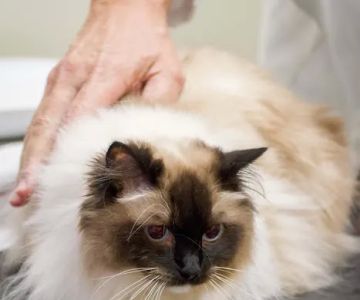What Tasks Will a Veterinary Assistant Perform? Understanding the Role and Responsibilities
- 1- What is the Role of a Veterinary Assistant?
- 2- Key Duties and Responsibilities of a Veterinary Assistant
- 3- Essential Skills and Qualities of a Successful Veterinary Assistant
- 4- Career Pathways for Veterinary Assistants
- 5- Real-Life Story: My Experience as a Veterinary Assistant
When considering a career in animal care, many aspiring professionals wonder, "Which of the following tasks will a veterinary assistant perform?" It’s a valid question, especially since the role of a veterinary assistant can vary depending on the clinic, the type of animals treated, and the veterinarian’s needs. In this article, I will walk you through the core duties and responsibilities of a veterinary assistant, as well as provide some insights into how you can succeed in this rewarding career.

2073 Mecklenburg Hwy, Mooresville, NC 28115, USA
See Details1- What is the Role of a Veterinary Assistant?
A veterinary assistant is a key player in any veterinary practice. Unlike veterinarians who diagnose and treat medical conditions, veterinary assistants focus on providing support to the veterinarian and ensuring that animals receive the best care possible. The role of a veterinary assistant is versatile and can involve everything from administrative tasks to hands-on animal care. It's an excellent entry-level position for those who are passionate about animals and want to make a difference in their lives.
In many practices, veterinary assistants work closely with veterinary technicians, who are trained to perform more advanced medical tasks, while the veterinary assistant focuses on assisting with procedures, preparing animals for treatment, and providing overall support. Veterinary assistants play a vital role in creating a smooth and effective workflow in the clinic or animal hospital.
2- Key Duties and Responsibilities of a Veterinary Assistant
The duties of a veterinary assistant can be quite varied, and this diversity makes the job both interesting and challenging. Here are some of the key tasks that a veterinary assistant will typically perform:
- Preparing Exam Rooms: One of the main responsibilities is preparing the examination rooms before an animal sees the veterinarian. This includes ensuring that the room is clean, sterile, and stocked with necessary equipment, such as syringes, bandages, and diagnostic tools.
- Assisting During Examinations and Procedures: Veterinary assistants often help during exams by restraining animals, holding them still, and providing comfort. They may also assist with basic medical tasks like administering vaccines, taking vital signs, and drawing blood for tests.
- Handling and Caring for Animals: Veterinary assistants are often responsible for the direct care of animals, including feeding, bathing, and walking them. This is especially important in animal shelters or veterinary practices that house animals overnight.
- Administrative Tasks: In addition to animal care, veterinary assistants are often responsible for managing office tasks such as scheduling appointments, maintaining records, and handling phone calls. This requires a strong understanding of office software and customer service skills.
- Cleaning and Sterilization: Ensuring that all instruments, tools, and equipment are properly sterilized is a critical part of a veterinary assistant's role. This helps maintain a safe environment for both animals and staff members.
The combination of medical and administrative tasks makes the job of a veterinary assistant quite dynamic. Whether you’re assisting in surgery, helping a distressed pet, or handling client questions, every day brings new challenges and opportunities to make a difference.
3- Essential Skills and Qualities of a Successful Veterinary Assistant
Being a veterinary assistant requires more than just technical knowledge of animal care. It also demands a number of soft skills that help make the workday go smoothly. Here are some key skills and qualities that can make a veterinary assistant successful:
- Compassion and Empathy: One of the most important qualities of a veterinary assistant is the ability to care deeply for animals. Veterinary assistants often work with injured, sick, or frightened animals, and having the empathy to help comfort them is crucial.
- Attention to Detail: Veterinary assistants need to be detail-oriented, particularly when it comes to administering medications, recording vital signs, and ensuring that all tools are sterile and ready for use.
- Strong Communication Skills: Whether you're speaking with clients, veterinarians, or other staff members, effective communication is key. Veterinary assistants must explain procedures to pet owners, listen to concerns, and provide clear instructions on post-care treatments.
- Physical Stamina: Working with animals can be physically demanding, and veterinary assistants must be prepared for the physicality of the job, such as lifting animals, standing for long periods, and performing repetitive tasks.
- Organizational Skills: Juggling multiple tasks and keeping track of appointments, patient records, and medications requires strong organizational abilities. Veterinary assistants often need to multitask and prioritize their duties efficiently.
By combining these technical and soft skills, a veterinary assistant can thrive in this career and provide excellent support to both the animals they care for and the veterinarians they assist.
4- Career Pathways for Veterinary Assistants
The role of a veterinary assistant offers a solid foundation for anyone looking to build a career in animal care. Many veterinary assistants use their experience as a stepping stone to further their education and become veterinary technicians or even veterinarians. This can involve additional schooling and certification but opens up more advanced career opportunities in the field.
For those who want to remain in the support role, there are other career pathways to explore, such as becoming a veterinary office manager, animal care coordinator, or even specializing in animal behavior or nutrition. The field of veterinary medicine is broad, and there are plenty of opportunities for career growth for those who are dedicated to the work.
5- Real-Life Story: My Experience as a Veterinary Assistant
During my time as a veterinary assistant, I had the chance to experience firsthand the variety and depth of the tasks required for this role. I remember one particular instance where a rescue dog came into the clinic, severely malnourished and covered in parasites. My role was to assist the veterinarian during the examination, take the dog’s vitals, and help prepare it for a thorough treatment plan.
The experience was both heartbreaking and uplifting. While the dog’s condition was dire, the joy of seeing it improve after proper care made all the challenges worth it. It was a powerful reminder of how much veterinarians and their teams can impact animals’ lives. Being a veterinary assistant gave me a front-row seat to these emotional moments, and I found it incredibly fulfilling.
If you're considering a career as a veterinary assistant, the rewards are plentiful, and there are many ways to get involved in animal care. For those interested in exploring more about this career, look for training programs, internships, and certifications to help you get started in this fulfilling role.










